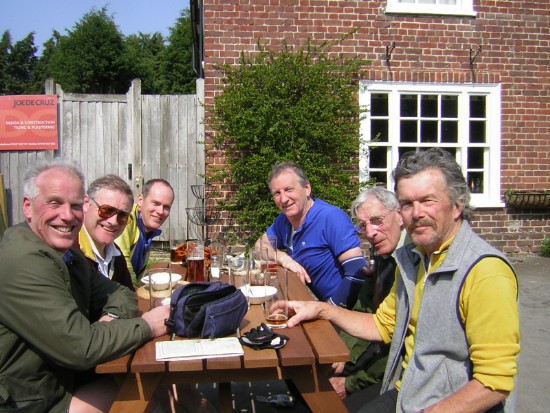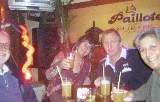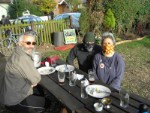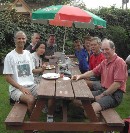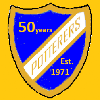Andy Jones - Potterers Cycling Club
The Potterers Cycling Club
Pottering in Kent for 50 years !
The Potterers Cycling Club
Pottering in Kent since 1971
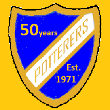



Words > Obituaries
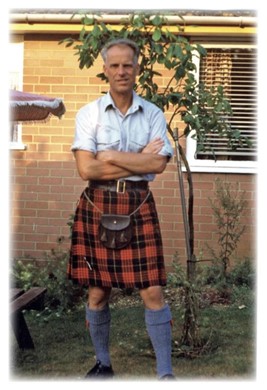
Andrew Glyn Jones was born in Victoria Hospital, in Morecambe, Lancashire, on 3rd October 1938 to Ellen Angelina Jones and Evan Robert Jones, a marine engineer. When he was a young boy Andrew’s family moved to North Wales, where he attended Holyhead County School.
In 1952 the family again relocated, this time to Dover, so Andrew completed his schooling with five years at Dover Grammar School for Boys. Those of you familiar with the school might be interested to know that it is currently in its final stages of a complete rebuild, with some old artefacts, which Andrew would have seen daily, being preserved.
Andrew continued to learn after leaving school; working in the East Kent coalfields for four years, where he gained further qualifications in the mining industry. He was passionate about the subject, and he could tell you the names of all the mines in the area; even those that hadn’t started to operate commercially. This morning, we entered the chapel listening to Elgar’s Nimrod performed by a colliery brass band. Also, Andrew’s neighbours Dave and Jeannette have recently found some of Andrew’s old photos, from sixty years ago, showing him with his colleagues at the pit.
The next stage of Andrew’s working life involved an impressive twenty seven years’ service for British Rail Ferries / Sealink, based at Dover Western Docks and in Folkestone. Andrew worked on the freight and haulage side of the shipping business, working his way up to the grade of shipping and transport manager. Imagine the dramatic changes in the shipping industry that he would have experienced between 1962 and 1989. Andrew continued to work in the shipping industry, taking on a specific role at Red Star Parcels, until retirement in the mid-nineties.
Andrew’s keen interest in transport reached far deeper than merely his involvement through work. He was a major supplier of ferry photos to several authors, and his images appeared in many books. You would find maritime pictures on the walls of his home, shelves filled with books alongside all his music CDs, a huge collection of Welsh railway DVDs, and plenty of videos relating to narrow gauge trains and their routes. Naturally, alongside an interest in narrow gauge railways comes the bigger picture that includes mines and quarries; an interest that started early on, in the coalfields of Kent.
>His friend Mike tells of Andrew’s love for the Ffestiniog Railway in North Wales. Andrew would rent a flat in nearby Porth Madog and visit the railway, with a few friends. He would either drive there, or take the train. Andrew made good use of the travel concessions he had gained from his British Rail work; sometimes travelling to share adventures with friends, and sometimes travelling alone to join official tour groups, particularly if they included privileged access to restricted areas. Mike says “He seemed to know his way round everywhere, taking me to places that I didn’t even know existed, where he would really soak up the atmosphere.”>Andrew, or Andy as he was known to many, adored the atmospheric music of Ralph Vaughan Williams, as well as British dance bands: Ambrose, Lou Stone, Jack Hilton, Geraldo, Billy Cotton, Ray Noble, Ron Goodwin and Cyril Stapleton, to name a few. He enjoyed listening to the Light Programme and BBC Radio Four. He enjoyed films too; especially old British films; with his favourites being “The Cruel Sea” and “Goodnight Mr Tom”. His fellow rail enthusiast Mike would often bring him educational DVDs about some of the overseas railways.
After settling in Dover as a boy, Andrew remained there, specifically its surrounding villages, including Kearsney and Nonington. He left the family home at the age of nineteen, after working hard to buy his own house; a sure sign of Andrew’s character, his independence and his determination.
>In 2006 he moved to Orchard Close in Whitfield, where it didn’t take long for his next door neighbours Jeannette and Dave to become his very close friends. They were the most valuable neighbours that Andrew could have wished for. All three of them would work in the garden together, with Jeannette and Dave tackling the heavy duty tasks. Later, when frustrated that he was unable to help with some of the more strenuous jobs, Andrew would potter about, saying “I’ll be supervisor” with a wry smile. There was always plenty of banter between Andrew and his next door neighbours, who describe him as the perfect neighbour. In fact, Dave says “If I could have chosen anyone at all to move in next door, it would have been Andrew”. They would see each other every day, with Andrew often; especially in the summer months; bringing his old white garden chair onto their sun-trap drive, so they could all sit together at the front of the house, watching the sun set, simply enjoying the moment, the conversation, the ale and wine, and each others’ company. They would call Andrew an encyclopaedia, full of interesting information, and a great companion with which to share a drink or two. He constantly listened to BBC Radio Four, and Dave and Jeannette would hear it daily from their driveway. Andrew always appreciated the domestic help he received from Jeannette; he was very thankful, for example, that she washed, ironed and professionally prepared his shirts so he was always smart when he went out.
>Andrew thoroughly enjoyed his holidays. He would often go away several times each summer; there were the Welsh visits and also the longer trips to Switzerland, where he would always meet like-minded travellers with which to share the holiday. He would take the Eurostar to Paris, having been dropped off at Dover Priory station, and he would enjoy the journey through France and Switzerland, travelling with other enthusiasts. With no fuss or special planning, Andrew would give Jeannette and Dave the dates and just set off, knowing they would mind the home, look after the cat, mow the lawns and generally keep the place ready for his seamless return to normal life.
>After becoming seriously ill in February this year, Andrew became more reliant on Jeannette and Dave. Their agreement to support him underpinned the care he received, allowing him to return home from hospital. Jeannette continued to do a lot of domestic work for Andrew. She took care of him twenty four hours a day, providing all his meals and snacks. Every now and then he would have a change of mind about which were his favourite dishes; one week scrambled eggs with prawns might hold the number one position, later to be toppled by fish pie, for example. Before long, fish pie would no longer be his favourite “because it was too fishy” and so it would continue. Andrew truly appreciated Jeannette’s care and her company, and they were always chatting and laughing. Dave would bolster Andrew’s spirits, saying he needed to get back on his feet, and before long they would be back in the garden again.
>Betty, a cyclist friend of Andrew’s, would often visit, and his friend Ron, an old cycling club colleague, biked up to Whitfield every Sunday, regular as clockwork; Andrew, Ron, Dave and Jeannette would enjoy their weekly chat on the drive before Andrew and Ron went inside for a cuppa. Andrew remained in regular contact with Mike, who would visit every few weeks, continuing to exchange books and emails.
>As I got to know him better, we discovered a number of interests in common: industrial archaeology; steam railways; British dance bands of the 1930s. He had a great sense of humour. We used to play a game that I called “parallel conversations”. The idea was to deliberately mistake an alternative meaning of a word or person, then follow that up with an opening for another mistake. A bit difficult to explain, but for example confuse Tee-shirt with something you wore at teatime. Follow this up with Earl Grey, and respond with a remark about Dorian Grey. And so on. Andrew would usually have me in tears of laughter, so that I could no longer respond, thus he won the game.
>On holidays, Andrew would like to combine great scenery with narrow gauge railways. I had several holidays with Andrew and other members of our group in diverse places as Wales, mid and north, the Lake District, Shropshire, the Cotswolds, North Yorkshire, Devon and even Suffolk. Andrew could usually be relied upon to find a self-catering cottage at the top of a very steep hill! (Never mind the climb, look at the view!) His knowledge of routes in those places was remarkable.
>He would try to spend at least one week in the year at Porth Madog, travelling on the Ffestiniog Railway, and later the revived Welsh Mountain Railway.
>Unfortunately, in his later years Andrew suffered from balance problems, loss of hearing and sight problems. This effectively put an end to his cycling, which he loved so much, but he was still able to get around by bus and train, and took part in several trips to Switzerland to explore the extensive network of narrow gauge railways there.
>Something that I only realised gradually about Andrew was his knack of doing good by stealth, He would arrange things so that people would meet without realising that they had been drawn together, or match objects with prospective owners so that they thought it was by accident. He was a true friend, and I shall miss him greatly.”
Quiet Reflection
Dave Rodd's eulogy
“I first met Andrew nearly 40 years ago. We were both members of the local branch of the Cyclists’ Touring Club. People who cycle for pleasure usually do so from a love of fresh air and the countryside. They often combine other interests to give a purpose to their outings. In Andrew’s case, he had a great love of nature: he knew where badgers had their setts; he could show you wild orchids, if he felt you could be trusted.
>Andrew had been cycling around Kent since he was a teenager, and knew all sorts of out of the way spots that the average person would not suspect. He enjoyed going off the beaten track, “rough stuff” as it is known, getting closer to nature than roads allowed. His ideal cycle ride would be to cover 50 or 60 miles in a day, sometimes more, stopping for sandwiches in a church porch or lych-gate somewhere, followed by a pint or two of “real ale” in a country pub. If not cycling, he was a great walker too, especially in the Lakes and Snowdonia.>As I got to know him better, we discovered a number of interests in common: industrial archaeology; steam railways; British dance bands of the 1930s. He had a great sense of humour. We used to play a game that I called “parallel conversations”. The idea was to deliberately mistake an alternative meaning of a word or person, then follow that up with an opening for another mistake. A bit difficult to explain, but for example confuse Tee-shirt with something you wore at teatime. Follow this up with Earl Grey, and respond with a remark about Dorian Grey. And so on. Andrew would usually have me in tears of laughter, so that I could no longer respond, thus he won the game.
>On holidays, Andrew would like to combine great scenery with narrow gauge railways. I had several holidays with Andrew and other members of our group in diverse places as Wales, mid and north, the Lake District, Shropshire, the Cotswolds, North Yorkshire, Devon and even Suffolk. Andrew could usually be relied upon to find a self-catering cottage at the top of a very steep hill! (Never mind the climb, look at the view!) His knowledge of routes in those places was remarkable.
>He would try to spend at least one week in the year at Porth Madog, travelling on the Ffestiniog Railway, and later the revived Welsh Mountain Railway.
>Unfortunately, in his later years Andrew suffered from balance problems, loss of hearing and sight problems. This effectively put an end to his cycling, which he loved so much, but he was still able to get around by bus and train, and took part in several trips to Switzerland to explore the extensive network of narrow gauge railways there.
>Something that I only realised gradually about Andrew was his knack of doing good by stealth, He would arrange things so that people would meet without realising that they had been drawn together, or match objects with prospective owners so that they thought it was by accident. He was a true friend, and I shall miss him greatly.”
Quiet Reflection
We will now pause for a short period of quiet reflection, as we listen to an excerpt from “Fantasia on a Theme of Thomas Tallis” by Ralph Vaughan Williams. Andrew specifically selected this piece of music for inclusion in today’s ceremony. You may choose to spend these moments reflecting on some of your happiest memories of times spent with Andrew, or the ways in which your lives and experiences have intertwined over the years. Or you may choose to think of a single happy event, a visual image, as the way in which you would like to remember him.
>Dave and Jeannette wish to take Andrew to rest in North Wales; and his other close friends have supported this decision. So, before he travels one last time to North Wales, we reach the part of today’s celebration of Andrew’s life, where we will formally bid him a fond farewell.
Closing Words
Closing Words
We heard David mention Andrew’s knack of doing good by stealth; a truly humanist quality; and how he managed to bring people together. Andrew Jones managed to connect a lot of people who had never previously met, but had each, in their own ways, been a treasured part of his life.
We will leave the chapel listening to the BBC shipping forecast theme music “Sailing By” performed by the BBC Symphony Orchestra, after which, all are invited to Orchard Close for light refreshments, and to peruse the various books containing some of Andrew’s ferry pictures, and other photographs. Footnote
Andrew was a fully paid-up, card-carrying
member of Humanists UK. At the heart of Humanism lies the belief that we each
have the responsibility to bring meaning and joy to our own lives, while
helping others to do the same; an ethical approach that you can no doubt easily
associate with Andrew.* Humanist ceremonies are non-religious, so we will have no
prayers and no hymns; just as Andrew would have wanted *
